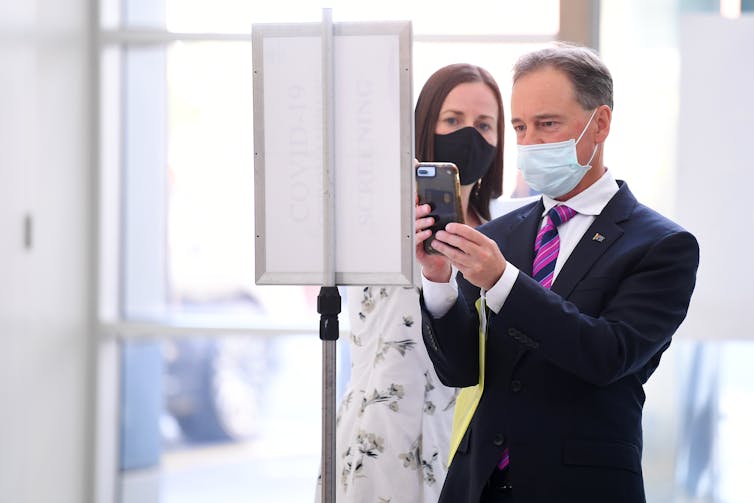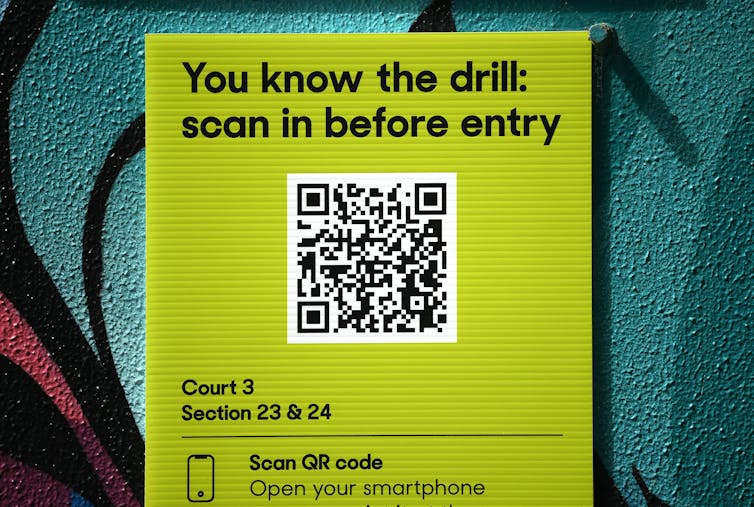Australia has all but abandoned the COVIDSafe app in favour of QR codes (so make sure you check in)
- Written by Paul M. Garrett, Post Doctoral Research Fellow, The University of Melbourne
The COVIDSafe app was pretty popular upon its release, with around 70% of surveyed Australians saying they supported the idea. And it was a good idea at the time. Now? Not so much.
Actual uptake was never high. By May last year, only 44% of those surveyed had actually downloaded it. Plenty on social media are now saying they’ve all but abandoned COVIDSafe in favour of the QR code check-ins done via, for example, the Victorian government app or the Service NSW app.
And when Victoria’s health minister Martin Foley was asked this week whether the COVIDSafe app had been used in responding to the latest outbreak, he said:
No. Not to my knowledge, and I’m sure in such a rare event it would have been brought to my attention.
For now, it seems the benefits to Australia’s public health may be better served by other technology, such as QR code check-ins. And the public cost of maintaining the COVIDSafe app may not be in our collective interest.
Was COVIDSafe a failure?
COVIDSafe was supposed to work by using Bluetooth technology to create an anonymous registry of close contacts (other app users). If one of your close contacts self-identified as having COVID-19 through the app, government contact tracers would be alerted and notify you to get tested and isolate, before starting manual contact tracing efforts.
It’s clear COVIDSafe didn’t live up to the hype, but understanding why may be more difficult than you might think.
Australia may be a victim of its own success in keeping the outbreak at bay. Having successfully suppressed the spread of COVID-19, the benefits of using COVIDSafe may not outweigh data privacy and security concerns many people had about it.
Even in places around the world where case numbers have been relatively high, this never guaranteed that a COVIDSafe-style contact tracing app would be widely used.
For example, Germany showed similar levels of app approval to Australia, but had similarly poor uptake of their CORONA-Warn App, even when their case numbers exceeded 30,000 per day.
Read more: 70% of people surveyed said they'd download a coronavirus app. Only 44% did. Why the gap?
And a large part of why QR scanning technology works is because we are reminded to use it when we enter a shop, restaurant or school. But there are no public reminders about COVIDSafe, and no consequences to not using it (whereas some — although by no means all — venues won’t let you in unless you can show you’ve checked in via a QR code scan).
Finally, there is no incentive to use COVIDSafe without public compliance. Without widespread support, COVIDSafe fails as a technology (it only works if others are using it in your proximity) and as a socially desirable behaviour (we often act and do things so as to fit in with our peers). This “social license” is necessary for any voluntary measure to be effective, and right now COVIDSafe doesn’t have it.
 A large part of why QR code scan technology works is because we are reminded to use it.
AAP Image/James Ross
A large part of why QR code scan technology works is because we are reminded to use it.
AAP Image/James Ross
QR code scan tech and Google location services
Human memories are prone to making errors, with people wrong about where they were about a third of the time. The cost of a memory error is high during a pandemic and misremembering which shopping centre you visited could have dire consequences.
This is why the QR code scan system works well. They are a reliable way to track where you have been, you’re constantly reminded to use it and you get notifications if you visited an exposure site.
There are, of course, gaps. Not all venues or places require QR codes because it is impractical, and the use of QR check-ins is not uniformly enforced.
If, like many people, you keep your phone’s location services on, that provides a back-up plan. You can easily download your location history and take a digital walk through your past week, month or year, identifying where you were down to the minute. And there are services like unforgettable.me that provide more detailed information from multiple sources, combining your location data with messages, emails, and weather forecasts.
 QR code scans work well but their use is not uniformly enforced.
AAP Image/DAVE HUNT
QR code scans work well but their use is not uniformly enforced.
AAP Image/DAVE HUNT
So, does Australia still need COVIDSafe?
Well, we need some sort of help to prevent memory errors that put others at risk. Overwhelmingly, people are more concerned about the health of others than themselves. What’s important is to remind others to use these technology aids, and highlight the public benefit of using them.
For now, it seems QR code check-ins are providing more benefit than COVIDSafe.
So if you are not using COVIDSafe, rest assured you’re not the only one. But there is still technology that helps you remember where you’ve been and when. That helps keep you and your loved ones safe and well.
Read more: By persisting with COVIDSafe, Australia risks missing out on globally trusted contact tracing
Authors: Paul M. Garrett, Post Doctoral Research Fellow, The University of Melbourne




